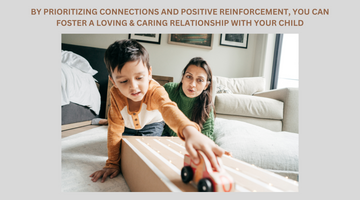Parenting is a rewarding yet challenging journey, and finding the right approach is crucial for your child's well-being. Parenting styles play a significant role in shaping a child's development, behaviour, and overall happiness. In this blog post, we will explore different parenting styles and their impact on children. We will discuss the benefits and potential drawbacks of each approach, helping you find the right balance that promotes your child's well-being.
1: Authoritarian Parenting :
Authoritarian parenting is characterised by strict rules, high expectations, and an emphasis on obedience. While this approach can establish discipline, it may lead to a lack of autonomy and self-esteem in children. However, setting clear boundaries and expectations can provide structure and teach children about respect and responsibility.
2: Permissive Parenting :
Permissive parenting is characterised by leniency and a lack of structure. While this style may promote a friendly and nurturing environment, it can lead to a lack of discipline and boundary-setting. Children raised with permissive parenting may struggle with self-regulation and encounter difficulties in following rules outside of the home.
3: Authoritative Parenting :
Authoritative parenting strikes a balance between setting clear rules and being responsive to a child's needs. This style promotes open communication, encourages independence, and provides guidance and support. Children raised with authoritative parenting tend to have better self-esteem, social skills, and emotional well-being.
4: Uninvolved Parenting :
Uninvolved parenting is characterised by a lack of emotional involvement and low responsiveness. This style can have detrimental effects on a child's development and well-being. Children raised with uninvolved parenting may struggle with emotional regulation, have difficulty forming healthy relationships, and experience lower academic achievement.
5: Finding the Right Balance :
Every child is unique, and finding the right parenting style is about understanding their individual needs and characteristics. Consider a blend of authoritative parenting, which provides structure and support, while also allowing for flexibility and individuality. Encourage open communication, active listening, and empathy to create a nurturing and supportive environment for your child.
Read more : Effective strategies for discipline and positive parenting
6: Tailoring Parenting Styles :
Flexibility and adaptability are key when it comes to parenting styles. Recognize that different situations may call for different approaches. For example, while authoritative parenting is generally effective, there may be times when a more permissive approach is suitable. Be attuned to your child's needs, adjust your parenting style accordingly, and seek a balance that promotes their emotional well-being.
7: Communication and Connection :
Building a strong parent-child relationship is essential for effective parenting. Maintain open lines of communication, create opportunities for quality time, and actively engage with your child's interests and concerns. Foster a safe and supportive environment where your child feels comfortable expressing their thoughts and emotions.
8: Consistency and Positive Reinforcement :
Consistency is crucial in parenting. Set clear expectations and enforce boundaries consistently. Use positive reinforcement to acknowledge and reward desired behaviour, which helps motivate your child and reinforces positive habits. Avoid excessive criticism and punishment, as they can erode self-esteem and hinder your child's emotional well-being.
Finding the right parenting style is an ongoing process that requires reflection, flexibility, and adaptability. While no single approach is perfect, aiming for a balance between structure, support, and open communication can create a nurturing environment for your child's well-being. Remember, each child is unique, so be attuned to their individual needs and adjust your parenting style accordingly. By prioritising connection, consistency, and positive reinforcement, you can foster a loving and supportive relationship with your child.






